What Works for Workers? A Conference on Public Policies and Innovative Strategies for Low-Wage Workers
Posted in Events
In response to the rapid growth of low-wage work, policymakers have proposed a wide range of interventions and strategies, from traditional approaches like raising the minimum wage and unionization, to investing in primary and secondary education and job training, to intervening in the labor market with “living wage” laws and stepped-up labor law enforcement. Yet systematic empirical analysis of the efficacy of these various interventions is relatively scarce. Which policy strategies are most and least effective, and under what conditions have they succeeded or failed? How does each of them impact low-wage immigrants and African Americans in particular?
February 23-24, 2012
Georgetown University Hotel and Conference Center
The Kalmanovitz Initiative hosted a two-day conference at Georgetown University that brought together an interdisciplinary group of scholars to focus on these vital questions, with special attention to the concerns of the labor movement and advocates for low-wage workers. Click here for a full agenda and paper abstracts.

